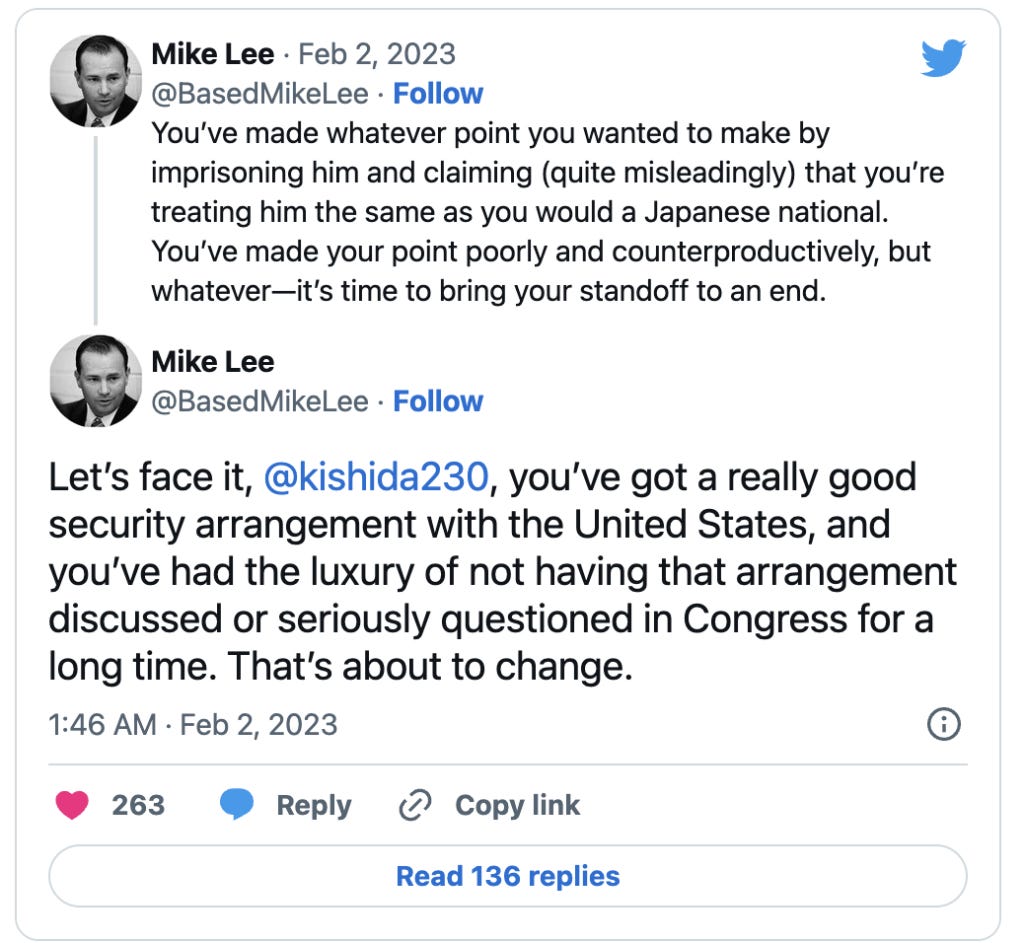Mike Lee’s Reckless, Feckless Deadline for Japan
The MAGA senator tries to talk tough in support of an American sailor imprisoned for accidentally causing two deaths.
On the last Saturday in May 2021, a California man named Ridge Alkonis took a day trip to Mount Fuji with his wife, three young children, and Australian labradoodle. They hiked in the springtime air for a few hours before getting back in their vehicle and driving home along Japan’s National Route 469. As the road curved through the countryside, the vehicle swerved: “I felt my body get weak, and my car drifted out of the lane, but I was able to quickly correct it,” Alkonis recalled. But five minutes later, while he was talking with his oldest daughter, the car veered again—this time off the road and into the parking lot of a small soba noodles restaurant in the Yamamiya district on the outskirts of Fujinomiya.
Alkonis’s wife and children screamed as the vehicle, moving at about 25 miles per hour, collided with several other cars and struck a 53-year-old Japanese woman, her 54-year-old husband, and her 85-year-old mother. The husband and mother both died.
Alkonis, who was then 33, was arrested at the scene, and the terrible incident instantly took on an international importance, as he is a lieutenant in the U.S. Navy—a weapons officer aboard the destroyer USS Benfold at Yokosuka Naval Base, one of the seven U.S. military bases on Mainland Japan. He was sentenced to three years in prison in October 2021, lost an appeal, and began serving his sentence last summer.
Before discussing the role of Sen. Mike Lee (R-Utah) in this story, it is worth noting some of the curious aspects of the case. For one thing, impairment from alcohol was not considered as a cause, as Alkonis is a Mormon and does not drink, and Japanese authorities never tested his blood for alcohol.
The Navy concluded that Alkonis experienced a bout of altitude sickness after the time spent hiking on Mount Fuji, but the Japanese courts rejected that explanation, based both on Alkonis’s own statements and on how altitude sickness usually occurs (it is usually experienced at higher altitudes and symptoms are usually alleviated as altitude drops, which was happening as the family drove home). Brittany Alkonis, the sailor’s wife, told the court “that she felt severely carsick due to the winding roads and could not take over driving for her husband,” according to Stars and Stripes. Ridge Alkonis told a prosecutor that he thought he could complete the trip before resting. The judge in the case concluded: “It is unlikely that the defendant suffered serious altitude sickness at the time” and that Alkonis had a “very basic and important duty” to stop driving if he felt drowsy.
Alkonis pleaded guilty and apologized in court, but reportedly expected that he would get a suspended sentence with no prison time, because he paid the equivalent of $1.65 million in gomen nasai—not a legal settlement, but an extrajudicial customary apologetic monetary restitution. Alkonis doesn’t come from money, and lieutenants don’t make a ton of money; the funds reportedly came partly from insurance and partly from what American friends and family members could scrape together.
Alkonis’s supporters frequently cite the statistic that 95 percent of people in comparable circumstances in Japan—that is, individuals found guilty of lethal negligent driving—receive suspended sentences. (According to Japan’s Ministry of Justice, the figure was 95.4 percent in 2019, 93.5 percent in 2020, and 94.2 percent in 2021.)*
The figure made its way into a letter signed by twenty Republican senators sent last year to Fumio Kishada, the prime minister of Japan. And Mike Lee, one of the signers of the letter and the senator who is leading the charge to see Alkonis freed, has repeated the statistic as well, including on the Senate floor.
Alkonis’s Navy pay was to be terminated at the end of 2022, but Lee scored a victory for him in the year-end spending omnibus late last year, getting a unanimously agreed-to amendment in the bill to pay Alkonis’s salary while he is in prison. Lee had earlier requested that the Navy grant an exception to the policy that imprisoned soldiers and sailors see their pay terminated. The Navy refused. (Ironically, just given the nature of partisan politics, Lee voted against the bill, knowing that it would pass anyway.)

People show their support to U.S. Navy officer Lt. Ridge Alkonis during a demonstration while U.S. President Joe Biden hosts Japanese Prime Minister Fumio Kishida at White House in Washington D.C., United States on January 13, 2023. Lt. Ridge Alkonis has been reported to the Tokyo Detention Center in July after a Japanese court found him guilty of negligent driving in the death of two pedestrians in Fujinomiya, Japan, on May 2021. (Photo by Celal Gunes/Anadolu Agency via Getty Images)
Perhaps unhelpfully, following Alkonis’s imprisonment, his supporters have circulated theories about why he was sent to prison instead of receiving a suspended sentence. Brittany Alkonis said:
One of the deceased is a family member of a prosecutor in the Tokyo high court who has a lot of influence. . . . I believe that has something to do with his sentencing.
She has also said that her husband’s “statements were misconstrued to fit the prosecutor’s false narrative,” that “we were extorted for $1.65 million,” and that he “was blackmailed to rescind evidence.”
Mike Lee, meanwhile, who says he has visited with Lt. Alkonis, interprets the case in geopolitical terms: The senator has suggested that the sailor is being scapegoated, as Japanese patience with crimes committed by American servicemen and women and their spouses there has worn thin. “Clearly the Japanese judicial system is trying to make an example of Lt. Alkonis—perhaps stemming from a history of disputes over our Status of Forces Agreement,” Lee said last July.
Last week, the senator escalated his rhetorical attack. Writing on one of his several Twitter accounts—the personal “Based Mike Lee” account understood to reflect his true thoughts—Lee, perhaps after a few Mountain Dews, went on a tear, tagging the Japanese PM with a series of threats:

Lee continued: “If you transfer Lt. Alkonis back to the U.S. before midnight on February 28, 2023, we will do our best to forget that this whole thing never [sic] happened. It will be hard, but we will try.”
In a staged “interview” Lee conducted last week with his own communications director—a bizarre practice, if you stop and think about it—he explained how he came up with the date of February 28: “There is no mathematical formula by which I achieved that, I just decided a few weeks ago.”
And what will Lee do if Alkonis is not out of prison by the end of the month?
We haven’t had a significant discussion in this country in a very long time about why it is that we have 55,000 U.S. military personnel stationed there [in Japan]. All the expense that goes along with that, all the sacrifice for U.S. military families that that involves. . . . My patience is almost at its limit. If we get to the end of this month and they still haven’t returned him to the United States, I’m going to be a lot more inclined to have that conversation and to have it with great frankness and openness.
The Japanese government might not find that a comfortable exercise. Because, really, they have a good thing going. We are providing for their security with those 55,000 Americans. Lee is correct to say that the United States is providing for Japanese security. But he leaves out something glaringly obvious to anyone who has studied the Second World War or who has thought for a moment about international relations: The U.S. military presence in Japan is vitally important to American interests and to global stability. The ability of the United States, and indeed the free world, to counter threats in the Pacific is strengthened immeasurably by the U.S. personnel and materiel and facilities based in Japan.
He also makes his remarks at a moment when Japan’s government has been engaging in the politically complicated work of building up its military, on the understanding that Japan might need to participate alongside the United States in any conflict over Taiwan.
For Lee to threaten that the vitally important U.S.-Japanese security relationship needs to be fundamentally reexamined for the sake of Lt. Ridge Alkonis is gravely irresponsible.
Let’s keep Lee’s threat in perspective. He is just one senator among a hundred, and he is in the minority party in the Senate. He does not even have any committee assignments of relevance. True, he’s not entirely powerless: He could introduce any number of bills proposing to make things painful for the Japanese, and could try to tear at the strings of the U.S.-Japanese alliance by slowing down funding. But such efforts would—for good reason—not get through the Senate or the House, let alone get signed by the president.
The chief thing he can do is talk—on the Senate floor, on TV and radio and the internet—in an effort to rally U.S. public opinion. But consider the possibility that Lee’s blustering will have the opposite of the effect he intends: that by elevating the case to the national level in Japan by attempting to call out Prime Minister Kishida, the matter of Alkonis serving out his full sentence might well become a genuine matter of public pride in that country, leaving Kishida’s government little room to maneuver.
Perhaps Senator Lee’s transformation from an anti-Trumper yelling “Noooo!” on the convention floor in Cleveland in 2016 to an ultra-MAGA senator has gone a step too far in terms of imitation as flattery. Lee might be “based” now, whatever he thinks that means, but perhaps he should base his threats in reality, where he would realize it is bad to undermine U.S.-Japanese relations over Alkonis’s sentence. Doing so only helps China, and last I checked, Lee was pretty hawkish on China.
*Update (Feb. 6, 2023, 11:40 p.m. EST): As originally published, the paragraph explaining the percentage of people in Japan convicted of lethal negligent driving said that “it’s unclear where this statistic comes from.” The paragraph has now been edited to include source data from Japan’s Ministry of Justice, and to remove the suggestion, derived from some press accounts, that providing gomen nasai is necessary for a suspended sentence in comparable circumstances, which is not a claim supported by data.



